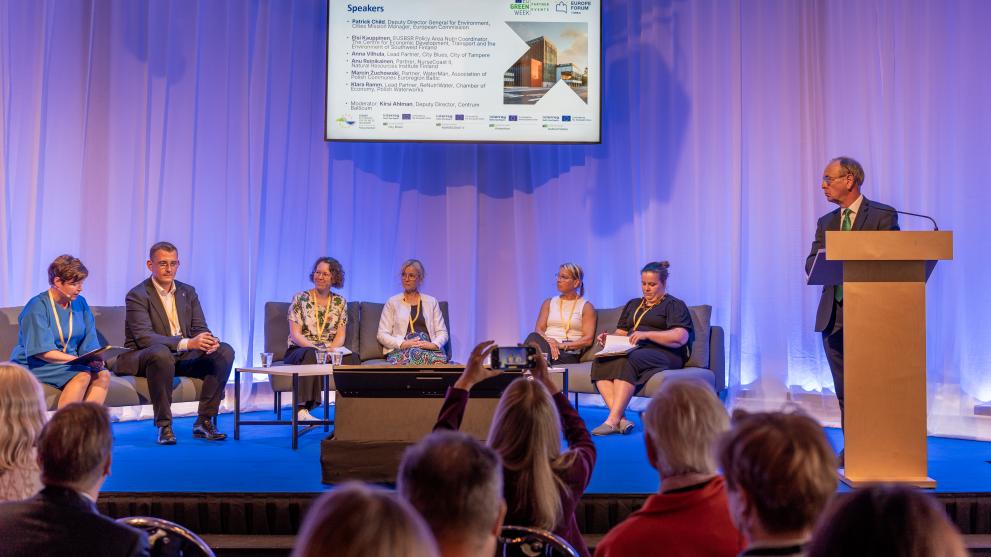
Sustainable Water Use is an Investment in Security
Water is a vital resource for all of us, and water security is an integral part of citizens' general safety. Water management challenges and solutions were discussed at our event, “Riding the Wave – Sustainable Water Management in the Baltic Sea Region,” organised by Centrum Balticum as part of the Turku Europe Forum. The discussion was also a European Green Week Partner Event. During the event, EUSBSR PA Nutri and four projects presented their solutions related to sustainable water use.
Water is a Strategic Issue
The opening words were delivered by Patrick Child, Deputy Director General at DG Environment. He emphasised the growing importance of effective water management.
- Climate change, poor practices, overuse, and pollution all harm our water economy, and the cost of this was €9 billion last year in Europe. Water is not only a local and regional issue but needs broader attention and measures. Therefore, the European Council has added water resilience to its strategic agenda.
- We need to go beyond traditional legislative instruments and also leverage technology, innovations, and investments to secure water resilience. Existing resources must be utilised effectively. For example, Interreg funds are a good instrument for finding new solutions, Child said in his speech.
Projects Help Municipalities Lead the Way in Water Management
In water management, cities and towns are in a key position. All four Interreg Baltic Sea Region Programme projects participating in the discussion work with public authorities.
City Blues brings together best practices for urban flooding and stormwater management in cities.
- Climate change increases flooding and stormwater in northern Europe. We also experience biodiversity loss. The project promotes nature-based solutions for these challenges. Sometimes, the solutions are even direct copies from nature itself, explains Anna Vilhula.
In coastal tourist areas, the capacity of wastewater treatment plants does not match the influx of people during the tourism season, causing overload and further contamination of the Baltic Sea.
- NURSECOAST-II aims to find alternative wastewater treatment solutions specifically adapted to tourist areas. We are testing pilots such as nanobubbles and exploring other new technologies, says Anu Reinikainen.
In northern Europe, we are accustomed to having plenty of fresh, drinkable water available. WaterMan promotes the idea that different qualities of water can be used for different purposes. Treated wastewater or rainwater could be used for flushing toilets and washing cars, says Marcin Żuchowski.
- Building stakeholder and consumer acceptance is also an important task of our project. For many, the idea of water reuse is still a novelty.
ReNutriWater is applying the concept of fit-for-purpose water.
- This means that urban wastewater is treated in a way that suits its intended purpose, such as cleaning, watering recreational areas and plants, or even for domestic use, explains Klara Ramm.
- We are testing different disinfection methods, watering plants with different types of water, and assessing the results. A key factor is demonstrating that the use of recycled water is safe.
Both Old Solutions and New Innovations are Needed
Coordinator Elsi Kauppinen from EUSBSR Policy Area Nutri noted that municipalities play an essential role in ensuring resilient water use, both in securing water sources and keeping water and nutrients in circulation.
- The solutions these projects present lead us towards more resilient societies, where biodiversity is considered in water management, and where we have systems that protect us from floods and drought.
Participants noted that resilient water management requires tailored solutions for each case and situation. New innovations are being developed, but many older solutions and existing technologies still work well. In some cases, old solutions may also be more affordable, as applying circular economy principles can still be costly.
It is also important to consider where critical technology is produced to remain resilient and avoid dependence on unstable markets.
#WaterWiseEU campaign
This story has been submitted by a partner of the #WaterWiseEU campaign. The EU-wide campaign focuses on water resilience, aiming to change the way we see, use and value water. Find out more about the campaign and how you can get involved.
Details
- Publication date
- 9 September 2024
- Author
- Directorate-General for Environment

